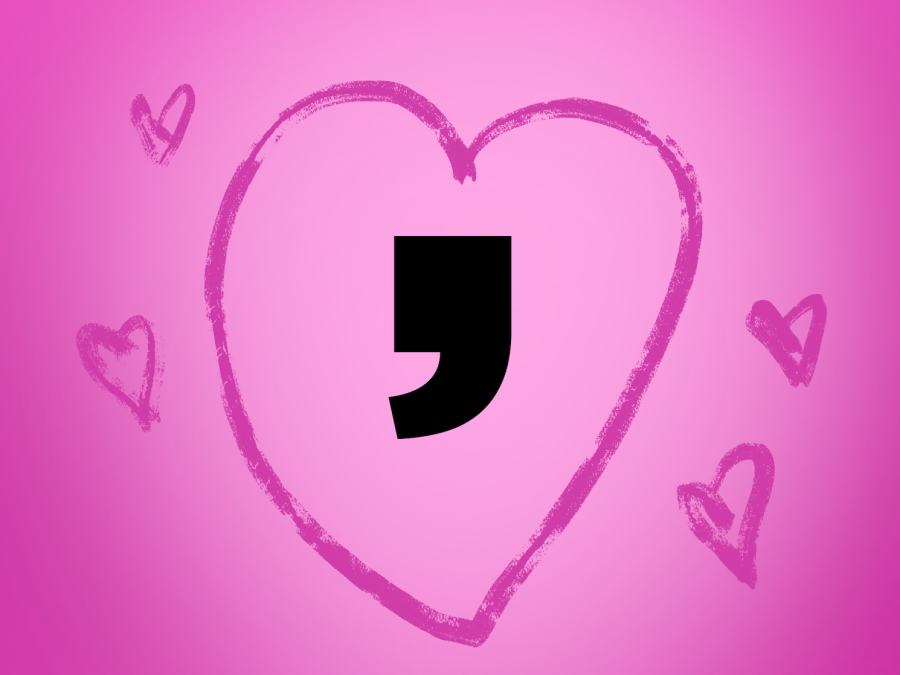Off-Third: Give the Oxford comma a break
One little mark is a helpful, clarifying, and necessary breath of fresh air. Stop getting rid of it.
The Oxford comma is versatile, powerful, and ultimately necessary. Omitting it causes pain, misery, and death. (Staff Illustration by Susan Behrends Valenzuela)
April 21, 2022
I know, I’m late to the conversation. It’s been years since debating the Oxford comma was quirky, edgy or indicative of genius-level IQ. But WSN gives me an outlet nonetheless, and I owe my thanks for this opportunity to my parents, Andy Hamilton and God.
No, I don’t think of either Hamilton or God as a parent. You might have thought so because of my British charm (I’m from Texas) or my heavenly qualities (I’m from Earth). But more probable was the inkling that something was wrong. The missing presence of an all-too-familiar mental break between the second-to-last and last thing on a list. The only thing powerful enough to stand between Hamilton and God: the Oxford comma.
Grammatically, the Oxford comma is simple. It follows the penultimate noun in a list. For example, I like apples, bananas, and oranges. Alternatively, the lack of the comma causes pain, misery and death.
According to Harvey R. Levenson, head of the Graphic Communication Department at California Polytechnic State University, anti-comma sentiments began when media outlets wanted to cut costs. Newspapers significantly reduced expenses by shaving off the extra comma for every writer’s story on millions of printed copies. They wouldn’t have to minimize costs by laying off employees, and papers would be cheaper for the consumer.
But, print journalism aside, every other anti-comma apologist should wholeheartedly embrace the Oxford comma. Fortunately, a 2014 survey showed that 57% of Americans were pro-comma, with only 43% firmly embedding their heads in the sand.
The chief functions of written media — such as books, magazines and blogs — are to entertain, educate and express. Because they take longer to write and publish, they have the time to incorporate the refreshing pause of an Oxford comma. The news is primarily concerned with collecting and disseminating information as soon as possible. That’s why it is acceptable for them to cut the subtle breath the comma provides.
One of the main arguments made by anti-comma enthusiasts is that the Oxford comma is unnecessary. People can grasp the colors of the U.S. flag from “red, white and blue.” A comma would be vestigial. However, the comma does indeed serve a function: to clarify sentences. The comma maintains a consistency reflected in how one might speak or think about the colors of the flag. Reading “red, white, and blue,” conjures colors in quick succession, compared to the articulating of “red” followed by the blurring of “white and blue.”
The lack of an Oxford comma also disrupts people’s flow of reading, causing them to revisit the sentence and scan for additional context clues. This is especially true of people whose first language isn’t English. In one world, we get rid of the comma because it’s extraneous decoration. In the other, the uncomplicated addition of a comma has the potential to increase reading comprehension and positively influence society.
Another argument against the Oxford comma is that it promotes bad writing. If “red, white and blue,” is so difficult to read, then rewording the sentence is probably a better choice. But this idea is not unique. In a society where the comma is normalized, you can still reword the sentence. The prevalence of the Oxford comma only expands the writer’s toolkit and diversifies their repertoire.
The Oxford comma is practical, clarifying and restorative. It gives us a chance to collect our thoughts. It gives us a better way of sharing them clearly with others. And it graciously prevents the mishaps that arise when lists get too confusing. So, if you find yourself as one of the 43% who view the comma as distasteful, think again.
Hamilton and God are not my parents, and it’s precisely the Oxford comma I have to thank for saving me. Those Thanksgiving dinners would be awful.
Off-Third is WSN’s satire column. Views expressed in Off-Third do not necessarily reflect those of WSN, and our publication of opinions is not an endorsement of them.
Contact Matthew Franco at [email protected].

























































































































































Kaitlyn • Apr 21, 2022 at 10:37 pm
Great piece! I am pro-comma all the way.
Stefania • Apr 21, 2022 at 2:10 pm
I can’t believe media outlets still subscribe to this archaic, and frankly barbaric, form of “grammar”. Thank you for fighting the good fight.
Steph Wittstruck • Apr 21, 2022 at 12:55 pm
this was lovely. I agree wholeheartedly